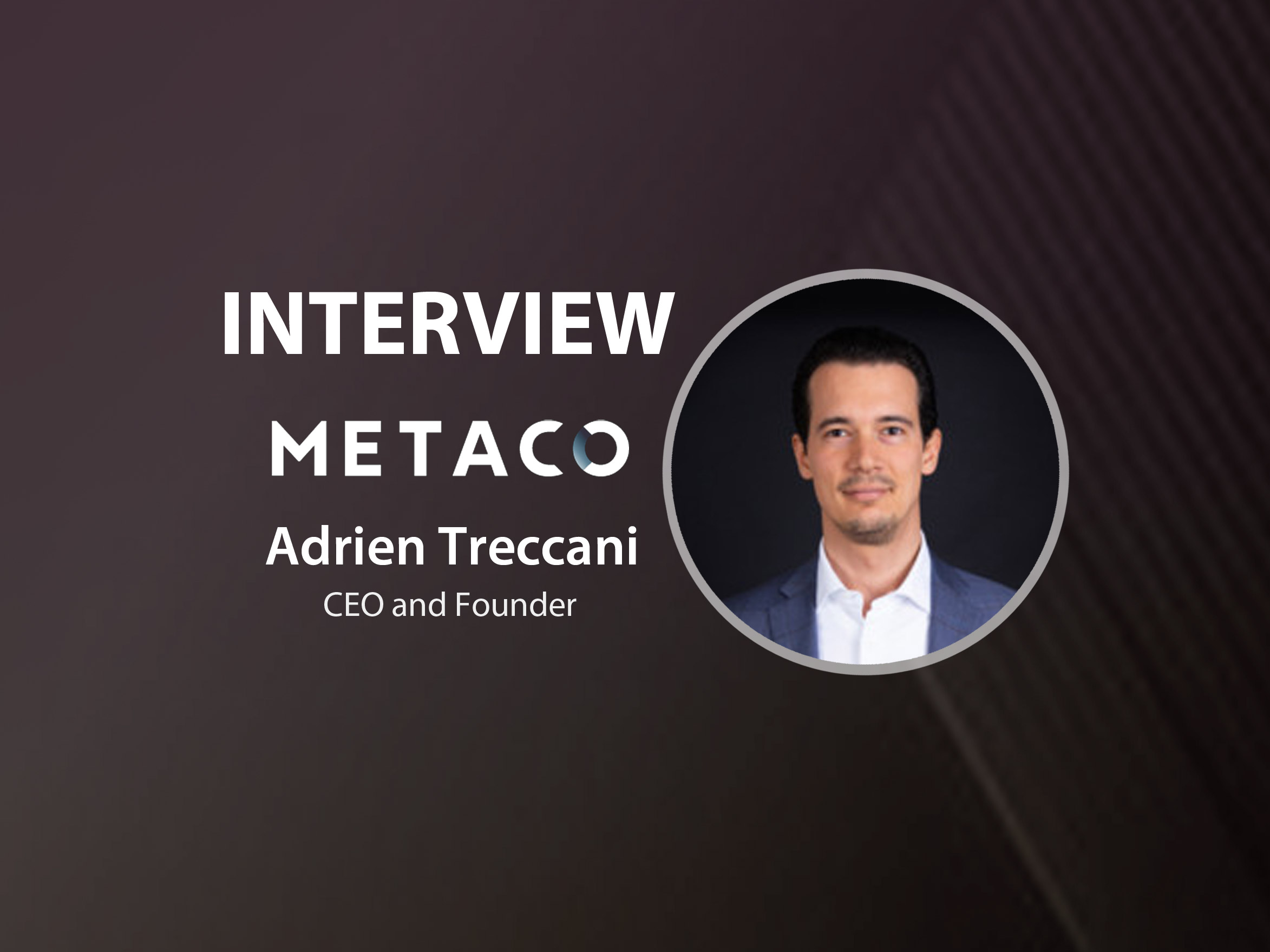Adoption of cryptocurrencies and digital assets has been one of many central themes in global fintech this year, with institutional adoption increasing in 2020. Adrien Treccani, CEO and Founder of METACO joins us in this interview to share a few thoughts on METACO’s journey, the future of cryptocurrencies and how by 2025 he expects digital asset custody will become a core service, provided by financial institutions globally.
____
Can you tell us a little about yourself Adrien? How did the idea behind METACO come about and what are some of the innovations you are working on for the near-future?
My background is originally in software engineering. I received a PhD in mathematical finance and high performance computing from the Swiss Finance Institute, and worked as an Algorithmic Trader in the hedge fund industry.
I came across Bitcoin in 2012, first as a speculative investment before quickly realizing how algorithmic trading applied particularly well to Bitcoin trading. I successfully built arbitrage and trading bots over three exchanges and started generating exponentially growing revenues using algorithmic trading.
When two of these exchanges were hacked and our funds were compromised, it brought the realization that the crypto industry urgently needed professional infrastructure to store assets along with secure key management, proper governance, and trustworthy companies.
METACO was founded exactly for this reason: to build institutional grade infrastructure for the management of digital assets. By operating as a trusted infrastructure partner to banks and financial institutions, we enable the onboarding of such institutions into the digital asset ecosystem and can propel traditional finance into a new era.
Research and development is a central pillar of the METACO brand, and we are constantly looking to innovate in what we do, and related areas of interest. As well as constantly striving to innovate in our security critical digital asset infrastructure for financial institutions, we are also working with two of the leading global central bank security suppliers Giesecke+Devrient and SICPA in the area of Central Bank Digital Currencies (CBDCs).
Read More: GlobalFintechSeries Interview with Clara Shih, CEO and Founder at Hearsay Systems
Fintech has evolved at a rapid pace over the last decade, there’ve been significant evolution and growth in digital assets, cryptocurrencies. What are some of your predictions for crypto in fintech and how will global markets keep the pace with the growing interest in crypto vis a vis their regulations…?
Institutional adoption of cryptocurrencies and digital assets has been the key theme of fintech in 2020 thus far. PayPal recently announced that it will bring crypto trading to its 325M+ users, while large banks, such as Standard Chartered, announced their plans for crypto based services, with many more preparing to go public.
Regulators are opening up to the idea of a regulated cryptocurrency market in most major financial centers, which will see easier and more integrated on-ramps towards cryptocurrencies.
The greenlight recently offered by the US Office of the Comptroller of the Currency (OCC) to allow all nationally chartered banks in the US to offer crypto custody services, is a major development which will likely spark a race among financial institutions to incorporate such solutions into their core services. This will likely see a trickle down effect as other jurisdictions, lagging behind in a regulatory framework for digital assets, will follow suit.
Enabling financial powerhouses in the US to offer crypto custody is a huge step towards mainstream institutionalization and retail access to cryptocurrencies which will fuel demand for Bitcoin and other digital assets globally.
What are some of the near-futures innovations you foresee transforming how digital asset management platforms will be planned and built over the next few years?
Currently, there is a heated debate among digital asset custodians as to whether Hardware Security Module (HSM) or Multi-Party Computation (MPC) technology offers the most adaptable key management solution for banks.
HSM based solutions allow crypto-asset owners to store the keys for their assets in “cold storage”, a storage method in which the carrier of the crypto key is not directly connected to the Internet. MPC based solutions use cryptography algorithms to create signatures splits over several users, where the signature process does not require signers to disclose their key to others.
I think we are likely to see significant development in the near future which will address this issue and allow financial institutions to benefit from the advantages of both forms of key management.
Read More: GlobalFintechSeries Interview with Gerard Griffin, CEO at AnyDay
How according to you will emerging tech like Blockchain/AI create an impact in this space (fintech / digital asset platforms)?
The impact of blockchain in our society is already clear. Adoption of digital assets and distributed ledger technology (DLT) use-cases by governments, financial institutions, and global corporations is at a peak that we have never seen before.
As these use-cases move from early development stages to mature solutions, we will see substantial changes in how modern society operates, and a transition to a financial system fit for purpose in the digital era where any individual can easily and securely access cryptocurrencies, tokens, and digital assets.
Given the overview of what fintech looks like today in 2020 and this evolving space: how would you describe this market in the next five years, fintech 2025?
By 2025 I expect to see digital asset custody become a core service, provided by financial institutions globally. Such a trend is already evident in Europe, where jurisdictions such as Germany have already developed the regulations enabling financial institutions to adopt digital asset management solutions. We are now seeing the same process take place in the US as the OCC has greenlit crypto custody for banks.
The launch of a number of CBDCs will also have a substantial impact on the fintech space. With a number of significant private digital asset payments platforms, such as Libra, coming to market, it is possible that an overlap in the services provided by CBDCs will gradually phase out smaller private platforms to leave a few major institutions in the market.
Read More: GlobalFintechSeries Interview with Jill Homan, President at DeepTarget
Before we wrap up, would you like to share specific finance management or business tips for Marketing and Sales or Finance teams struggling through this uncertain time due to the Covid-19 pandemic?
In the current uncertain times, I think it is important for teams to continue moving forward with their plans. Economic downturns often trigger significant periods in innovation and radical societal changes. Some of the biggest companies globally were founded during periods of recession, and shaped new ways of operating in the economy. The same process may now be underway in our financial system, as incumbent institutions look to innovate and move with the times.

METACO is the leading provider of security-critical infrastructure enabling financial institutions to enter the digital asset ecosystem. The company is trusted by top banks, exchanges and infrastructure providers globally. Founded in 2015, METACO brings together a diverse team of industry specialists in software, security, cryptography and banking to transform the financial services industry. The company is deeply integrated into the banking sector through a growing network of strategic partners and institutional shareholders.
Adrien Treccani is the CEO and Founder at METACO
